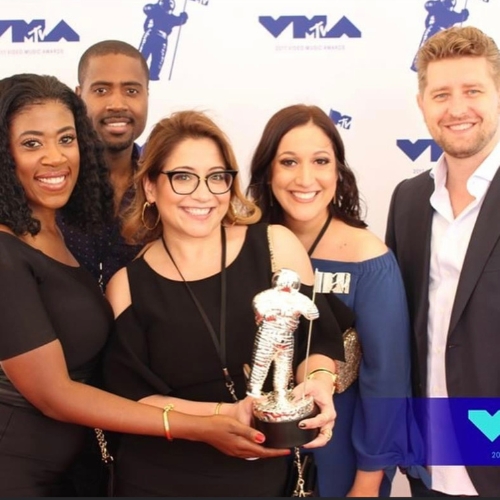How It Began
I’d wanted to work at MTV ever since I was ten years old, long before I even knew what a career was. Back then, I didn’t know anything about being an inspiring leader; I just knew I loved MTV and felt connected to its rebellious, irreverent vibe. Watching the original VJs like Martha Quinn, I thought, We could be amazing friends. Even as a kid, I believed I could fit in there.
Fast forward almost two decades, and I walked through the MTV offices as an intern, vowing to make it my permanent home. By then, in my late twenties, I had a clearer idea of my goals: I wanted to be a decision-maker, a respected executive, and an inspiring leader. But I quickly realized leadership wasn’t something you simply grow into—it’s something you work for, and often, your environment may not immediately support that growth.

Lesson #1: Watch and Learn
Be hungry for knowledge. Observe the leaders around you—emulate the good and learn from the bad. Early in my MTV career, I was lucky enough to have a few great bosses. They were generous with their knowledge and offered me opportunities for growth. But, I was impatient. At 28, as a department assistant, I felt like I was behind my peers. I asked for a promotion and was denied. That rejection festered into anger and resentment, which clouded my vision. Looking back, I realize that I could’ve learned more from observing their leadership styles, rather than rushing to climb the ladder.
Take note from an inspiring leader like Oprah Winfrey or Michelle Obama, who both advocate for patience and learning. They didn’t rush to the top—they observed, grew, and took every opportunity to learn from those around them.
Lesson #2: If You’re Going to Fail, Fail Forward
Look for opportunities to lead, and when you fail, fail forward. About five years into my MTV career, I was tasked with programming MTV2’s shows—my first “high stakes” responsibility. For Halloween, I decided to run a marathon of The Osbournes, a decision that triggered a massive wave of royalty payments—a million-dollar mistake. I wasn’t fired, but I was reprimanded.
The biggest lesson? How my boss handled it. She listened, gave me room to assess my performance, and helped me clean up the mess. Instead of beating myself up, I learned from her leadership: calm under pressure, guiding without tearing down. Great leaders like Nelson Mandela exemplified this—turning failures into learning opportunities, both for themselves and others. The next time I handled a budget, I made sure those mistakes didn’t come from me.
Lesson #3: Be Ready to Put in the Time
We can’t all be born natural leaders like Alexander the Great or Joan of Arc. For most of us, leadership is a skill that takes time to develop, and experience is the best teacher. In my junior roles, I didn’t always recognize the opportunities to lead, even when I had a small team of interns under my guidance. I wasn’t great at leading them—I failed. But we all need to start somewhere.
Leadership takes time, practice, and patience. Angela Merkel didn’t rise to lead Germany overnight; her leadership evolved over years of experience, trials, and mistakes. Don’t be discouraged by slow growth—great leaders are built over time.

Lesson #4: Don’t Mistake Success for Inspired Leadership
One of the hardest lessons I learned is that just because someone is successful doesn’t make them an inspiring leader. For a time, I became obsessed with promotions, titles, and pay raises. I thought being the most ambitious or aggressive was the way to get ahead. I excused poor behavior in myself and others, believing that if some “successful” leaders were ruthless, maybe that was the secret.
But I eventually realized that fear may push people, but only inspiration can truly lead them. Think about Mahatma Gandhi or Malala Yousafzai—they achieved great things not by force, but by inspiring others with their vision, integrity, and unwavering belief in something bigger than themselves.
Lesson #5: Inspiring Leaders Take Their Careers into Their Own Hands
One of the most empowering lessons I learned is that you can’t wait for your company to develop you into an inspiring leader. When I asked for an executive coach, I was denied because senior executives didn’t see coaching as essential. But waiting for your employer to mold you into a great leader isn’t enough.
In today’s world, you have countless resources at your fingertips. Brené Brown talks about vulnerability and courage as key leadership traits, while Simon Sinek preaches the importance of “starting with why.” The tools for growth are out there—you just have to grab them.
Luckily, the coaching industry has exploded, giving you access to professional development that wasn’t available before. So don’t wait for your company to make you a leader—invest in yourself, find a coach or mentor, and take your career into your own hands.
Conclusion
The journey to becoming an inspiring leader is never straightforward, but it’s always within reach. If you’re interested in talking more about resources available to you, let’s chat and work on your goals together. Remember: failure is part of the process, but with each setback, you can fail forward.
XO,
Trisha




Comments +